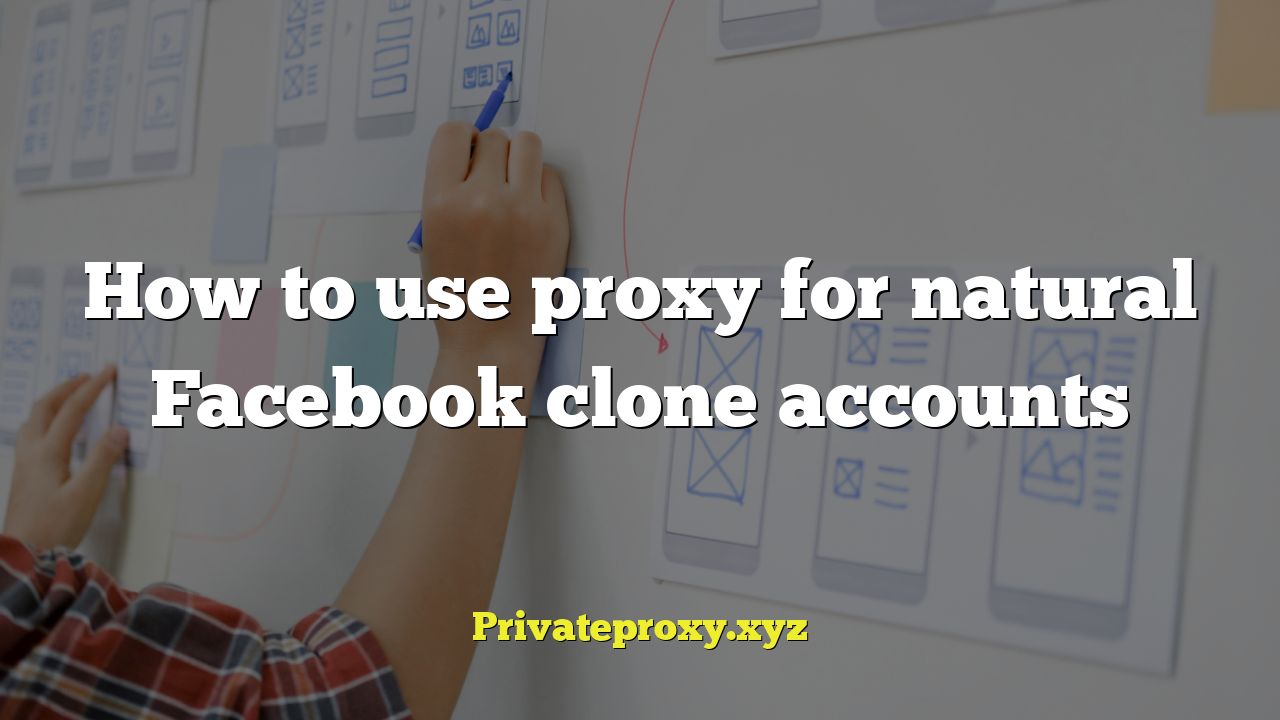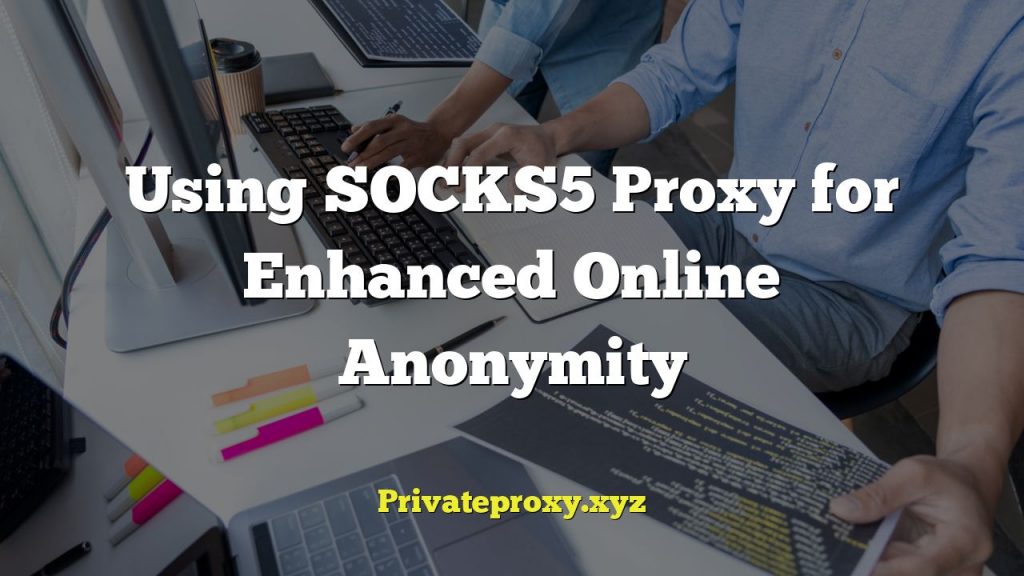
How to Use Proxies for Natural Facebook Clone Accounts
Introduction: The Need for Proxies in Facebook Cloning
Creating and managing multiple Facebook accounts, often referred to as “clone accounts,” can be a powerful strategy for various purposes, ranging from social media marketing to online research. However, Facebook’s sophisticated anti-spam and anti-fraud measures make it challenging to operate numerous accounts from a single IP address. This is where proxies come into play. A proxy server acts as an intermediary between your computer and the internet, masking your real IP address and presenting a different one to Facebook. By using different proxies for each clone account, you can mimic the behavior of multiple users accessing the platform from different locations, reducing the risk of detection and account suspension. This article will guide you through the process of selecting, configuring, and using proxies to create and maintain natural-looking Facebook clone accounts.
Understanding Proxy Types and Their Suitability
Not all proxies are created equal. Different types of proxies offer varying levels of anonymity, speed, and reliability. Choosing the right proxy type is crucial for successful Facebook cloning. Here’s a breakdown of the most common proxy types:
- Dedicated Proxies: These are private proxies assigned exclusively to you. They offer the highest level of anonymity and speed, making them ideal for resource-intensive tasks like Facebook automation. However, they are also the most expensive option.
- Shared Proxies: As the name suggests, shared proxies are used by multiple users simultaneously. This makes them more affordable than dedicated proxies, but also less reliable and slower. They are more likely to be detected by Facebook’s anti-spam systems.
- Residential Proxies: These proxies use IP addresses assigned to real residential users. They are the most difficult to detect because they appear as legitimate users browsing the internet. Residential proxies are generally more expensive than datacenter proxies but offer better anonymity.
- Datacenter Proxies: These proxies originate from data centers, making them easier to detect by Facebook. They are typically faster and cheaper than residential proxies, but also carry a higher risk of account suspension.
For creating natural-looking Facebook clone accounts, residential proxies are generally recommended due to their high level of anonymity and lower detection rate. However, dedicated datacenter proxies can be used cautiously if managed properly.
Selecting the Right Proxy Provider
Choosing a reputable proxy provider is essential. Look for providers that offer:
- A wide range of proxy locations: The ability to select proxies from different countries and regions helps mimic natural user behavior.
- High uptime and reliable performance: Proxies should be consistently available and provide sufficient speed for browsing Facebook.
- Good customer support: A responsive support team can help you troubleshoot any issues you encounter.
- Rotating proxies: Some providers offer rotating proxies that automatically change the IP address at regular intervals, further enhancing anonymity.
Research and compare different providers before making a decision. Read reviews and consider factors like pricing, features, and customer support.
Configuring Proxies for Facebook Clone Accounts
Once you’ve chosen a proxy provider, you’ll need to configure your proxies for use with your Facebook clone accounts. Here’s a general guide:
- Obtain Proxy Credentials: Your proxy provider will provide you with a list of proxy addresses, ports, usernames, and passwords. Store this information securely.
- Configure Your Browser: You can configure your browser to use a proxy server. Most browsers have built-in proxy settings that can be accessed through the settings menu. Enter the proxy address, port, username, and password when prompted.
- Use a Proxy Management Tool: For managing multiple Facebook accounts and proxies, consider using a proxy management tool. These tools allow you to easily switch between different proxies and manage your accounts efficiently. Examples include Multilogin, GoLogin, and SessionBox.
- Test Your Proxy: After configuring your proxy, test it to ensure it’s working correctly. You can visit a website like whatismyipaddress.com to verify that your IP address has been changed.
Best Practices for Creating Natural-Looking Facebook Clone Accounts
Using proxies is only one piece of the puzzle. To create truly natural-looking Facebook clone accounts, you need to follow these best practices:
- Use Unique Information for Each Account: Avoid using the same email address, phone number, or profile picture for multiple accounts. Create unique and believable profiles for each account.
- Mimic Human Behavior: Don’t engage in automated or repetitive actions that could trigger Facebook’s anti-spam systems. Simulate real user behavior by browsing different pages, liking posts, joining groups, and interacting with other users.
- Warm Up Your Accounts: Don’t start using your clone accounts aggressively immediately after creating them. Gradually increase activity over time to make them appear more natural.
- Avoid Sharing Information Between Accounts: Avoid linking your clone accounts to each other in any way. This includes friending each other, joining the same groups, or using the same payment information.
Maintaining Your Facebook Clone Accounts
Once your clone accounts are up and running, you need to maintain them to prevent them from being flagged as fake or suspended. Here are some tips for maintaining your accounts:
- Regularly Update Your Profiles: Keep your profiles active by updating your status, posting photos, and engaging with other users.
- Monitor Account Activity: Keep an eye on your accounts to ensure they are not being flagged for suspicious activity. Check for warnings or notifications from Facebook.
- Rotate Proxies: Periodically rotate your proxies to further enhance anonymity. This can be done manually or automatically using a proxy management tool.
- Stay Informed: Stay up-to-date on Facebook’s anti-spam policies and adapt your strategies accordingly.
Advanced Techniques: Mobile Proxies and Account Automation
For even greater anonymity and scalability, consider using mobile proxies. Mobile proxies use IP addresses assigned to mobile devices, making them even harder to detect than residential proxies. However, they can be more expensive and require specialized tools.
Account automation can also be used to manage multiple Facebook clone accounts efficiently. Automation tools can help you automate tasks such as posting updates, joining groups, and sending friend requests. However, use automation tools cautiously and avoid excessive or repetitive actions that could trigger Facebook’s anti-spam systems.
Troubleshooting Common Proxy Issues
You may encounter issues when using proxies for Facebook clone accounts. Here are some common problems and their solutions:
- Proxy Not Working: Verify that your proxy settings are correct and that your proxy server is online. Try using a different proxy server or contacting your proxy provider for assistance.
- Facebook Blocking Proxy: Facebook may block certain proxy servers that are known to be associated with spam or fraudulent activity. Try using a different proxy server or switching to a residential proxy.
- Slow Connection Speed: A slow connection speed can be caused by a slow proxy server or a poor internet connection. Try using a different proxy server or upgrading your internet connection.
- Account Suspensions: Account suspensions can be caused by violating Facebook’s terms of service. Review Facebook’s policies and avoid engaging in any activity that could be considered spam or fraudulent.
Conclusion: Balancing Anonymity and Naturalness
Using proxies is essential for creating and managing natural-looking Facebook clone accounts. By carefully selecting your proxy provider, configuring your proxies correctly, and following best practices for creating and maintaining your accounts, you can minimize the risk of detection and suspension. Remember to prioritize naturalness over automation and always stay informed about Facebook’s anti-spam policies. Striking the right balance between anonymity and natural behavior is key to achieving success with Facebook clone accounts.


